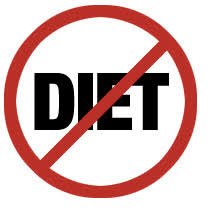The Problem with Dieting—and What to Do Instead
Why restriction doesn’t work—and what actually does
We started out like many others in this field: putting people on diets. That’s what we were trained to do. But it didn’t take long to see the truth—there was no magic in food restriction. In fact, it quickly became clear that dieting wasn’t just ineffective it was causing real harm.
Here’s what we saw when a person had tried to manipulate their food, again and again:
Obsessive thoughts about food
Intense cravings
Compulsive eating
And yes, eating disorders
In fact, there’s research going back to the 1960s showing that dieting doesn’t work—and worse, it often causes the very issues it claims to fix.
Study after study shows that long-term weight loss almost never happens through restriction. In 95 to 98% of cases, people regain the weight. Some research suggests the failure rate may be as high as 99%.
If you’re feeling skeptical, try finding even one study where most people successfully lost weight long-term. I’ve looked. I’ve never found one.
In fact, over one-third of people who restrict food to manage their weight end up gaining even more than they lost. Sound familiar?
Are you heavier today than when you first tried to lose weight?
Diets don’t just fail—they often backfire.
If 95 to 99% of people couldn’t succeed with a treatment, wouldn’t we question the treatment?
“If a doctor prescribed a new drug with a 95 to 99% failure rate, then blamed you when it did not work, how would you feel?”
And yet, when weight loss doesn’t “stick,” most people blame themselves. Even professionals blame the person—not the plan.
We won’t do that. And we won’t promote food restriction. We believe doing so is not only unhelpful—it’s unethical.
The Problem with Using External Controls to Manage Food
Dieting, counting calories or points, cutting out foods, and setting rigid food rules are all external ways to control eating. The goal is usually to change the body’s size or shape. When someone manages eating this way, we call it being an “externally-regulated” eater.
And here’s the catch: research shows that externally-regulated eaters are more likely to feel out of control around food. They’re more prone to what’s called “disinhibition”—eating more than they want to, even when they’re trying not to.
It’s the opposite of what most people are trying to do.
Thankfully, there’s a different path.
Your Body Already Knows How to Eat, and How to Easily Stop Eating
Our bodies are wise. They know when they need energy—and when they’ve had enough.
We are all born with this ability.
Ever fed an infant? She cries when she’s hungry and turns away when she’s done—even if it’s chocolate cake.
She is able to eat exactly how much she needs to successfully manage her food and weight. And unless something disrupts that ability, she’ll keep doing it.
But as we grow up, a lot can interfere with that natural self-regulation:
Being told to eat less
Being told to eat more
Being told to eat “better”
Being forced to clean our plates
Feeling ashamed of our bodies
Hearing from professionals that we’re in danger if we don’t lose weight
Little by little, we stop trusting our internal signals. We start relying on portion sizes, calorie counts, “healthy eating” guidelines, and rules from others.
Outsourcing Eating and Weight Management
With all the diet books, weight loss plans, food tracking apps, and well-meaning advice from friends and family, it’s easy to start believing we need a plan to eat “right.”
But no plan—no matter how scientific—can account for your shifting needs: metabolism, hormones, sleep, stress, movement. Every day is different. So it makes sense that our food needs are, too.
No expert or app can know what your body needs in any given moment.
But your body does.
And if you can relearn how to listen to it, you’ll realize that you don’t need a plan. You don’t need permission. You already have the wisdom you need—built right in.
In fact, the more you follow your body’s signals, the less likely you are to overeat. Really.
The nondiet approach—also known as intuitive eating or attuned eating—can help you reconnect with that wisdom. So food becomes easier. So you can live in partnership with your body.
The Problem Was Never Your Food or Your Body, but the Battle Against It
No plan or program—not even the most well-meaning one—can know your body better than you.
When we stop outsourcing our food management, and our weight management—our choices, and our worth to outside systems—something powerful begins to happen:
We come home to ourselves, to our own eating wisdom.
You were born with the ability to eat with ease, to nourish yourself without fear, and to live in a body you trust. That wisdom is still there. And it’s waiting for you to return to it.
We are here to help you find your eating wisdom, step-by-step. To help you find a way to easily manage your food, eating and weight.
There’s More to Explore
There’s another way to relate to food—one that doesn’t require willpower, restriction, or constant second-guessing. In our next blog, we’ll introduce you to intuitive eating: a compassionate, body-led approach that helps you return to the wisdom you were born with.
Read: What Is Intuitive Eating? (And Why It’s Not a Free-for-All)













